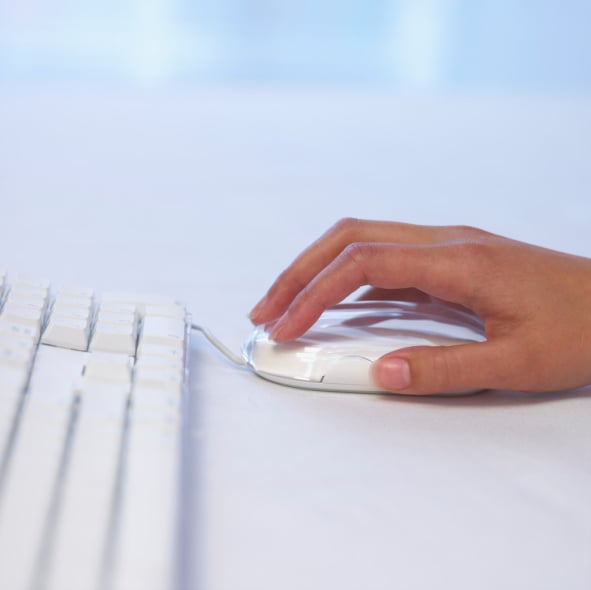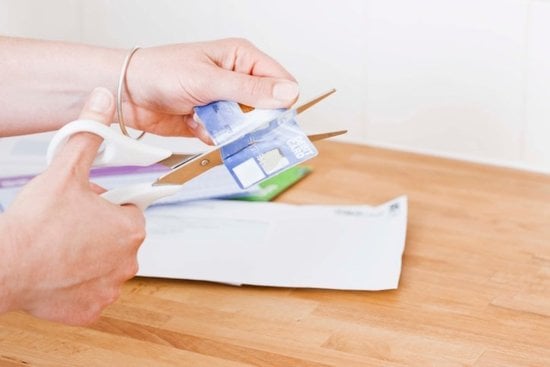The best way to stick to New Year's resolutions (or any type of resolution, for that matter) is to keep it simple. You may wonder how you can streamline such a complex process — there are so many possible resolutions to commit to! The answer is easy: just pick one resolution. Read on to see our suggestions and pick your favorite.
Drop Your Daily Deal Habit

This year, resolve to drop your daily deal habit. Buying coupons can be extremely addictive, because sometimes the deals are just too tempting. But oftentimes, you'll end up doing something that you never planned on doing in the first place and trying restaurants that you had no intention of trying to begin with. The problem with buying deal after deal is that you might forget about them if you're not carefully keeping track of them, and you may end up losing money when the coupon expires.
Do yourself and your budget (not to mention your inbox!) a favor this year, and unsubscribe from all the daily deals sites except your all-time favorite. Also make it a plan to use up all the daily deals you have yet to use this month. I know there may be deals that seem too good to miss out on, so limit yourself to buying one or two online coupons this year. If you're worried about missing out on an amazing deal, I'm sure you'll catch wind of it through friends or social media. And if you miss one, either scout for it on sites that sell unused daily deals like CoupRecoup [1] or patiently wait for it to show up again.
Quit Your Caffeine Addiction

Caffeine addiction is so commonplace that nobody will bat an eye if you say you need your daily dose of coffee. In fact, many of us would readily admit to an addiction. Though people claim that coffee benefits them, the efficacy of the brown liquid is often misconceived. For starters, studies have shown [2] that although caffeine may give you more speed, you'll be more prone to making mistakes. This means even if you have a larger output, it'll be of lower quality. More negatives include feeling jittery when you drink too much coffee and withdrawal symptoms like headaches if you choose to stop drinking. Convinced? Here are some tips to kicking your caffeine habit to the curb for good this year.
- Figure out your quitting style. Everyone has their own way of kicking bad habits, and you can either choose to go cold turkey or ease off it slowly. Remember, if you go cold turkey and suffer withdrawal symptoms, don't take any pain medication for your headaches since those have caffeine in it as well!
- Find a replacement. When you find yourself craving coffee, try to replace it with caffeine-free tea. Chamomile and mint tea are always good options.
- Try decaf. When you just miss the comfort of the taste of coffee, opt for decaf. Keep in mind that there's actually a small amount of caffeine in a decaffeinated cup of joe, so drink a small cup.
Of course, it's up to each individual to decide if quitting coffee is right for them. I'd say you should truly consider it if you're drinking excessive amounts (I'm talking more than three or four cups a day) and if you're feeling some of the negative effects of caffeine.
Make a Phone Call to Lower Your Bills

If you've been putting off calling your provider to negotiate lower rates, stop procrastinating and pick up your phone! Remember, the worst thing that will happen is just hearing the answer "no." Consider calling these companies to negotiate with.
- Cell phone provider
- Credit card companies
- Cable and Internet providers
Apart from negotiating better rates and plans, also consider asking to waive any fees or penalties that you've recently been charged with. Now that you're ready to make the call with a list of companies in mind, here are tips on how you should approach the call:
- Do your research. Do your research on what their competitors offer so you'll have more ammunition for your phone call. You'll also have more of a gauge of what's considered a good rate.
- Be nice but assertive. Don't dance around the issue but be nice when you're explaining the situation to them. Don't get upset if you can't seem to be getting the response you're looking for. You can always try your luck with the manager or call back again.
- Ask for options. Tell the provider that you can't afford the current prices and ask them what can they offer to you to help with the situation. Asking an open-ended question is always better than a "yes" or "no" because it'll be harder for the rep to refuse you.
- Threaten to cancel. And of course, you can always threaten to leave the service. They'll probably transfer you to a retentions department when you bring up the topic of leaving, and those representatives have more authority to offer better rates.
Reassess Your Savings Account

An important to-do on your financial list is to have a savings account. One of the first things you need to do is to establish a savings account where you can start putting your money. If you don't have one, then it's time to get one. If you already have one, then you might want to reassess the one you currently have. Here are a few tips to help you make the right decision.
- Do some research. First, do some research to see which one will be the right savings vehicle for you. There are plenty of low-risk accounts to put your money in. Some institutions include online banks, community banks, and credit unions. You can also go to SavingsAccounts.com [3] to find the account with the best interest rate. For other alternatives, check out these 10 low-risk ways [4] to earn more on your savings.
- Consider a checking account. Interest rates on savings accounts are pretty low right now, and the rates seem to keep dipping. Some checking accounts offer better deals, although there are more stipulations, such as the number of times you have to use your debit card. Bankrate did a study of the best high-yield checking accounts [5] in 2014, and there was one credit union that even offered a six percent interest rate. However, keep in mind that checking accounts are more liquid, and it may be easier to spend the money in those types of accounts.
- Before you pick. Make sure you read the fine print, and know the restrictions of your account. For example, in the case of savings accounts, there is usually a limit on how much money you can leave in the account and limits on how often you can withdraw or transfer money. Ask yourself if these are restrictions you can deal with.
- Leaving your bank. If you decide to leave your bank instead of moving your money around, there are several steps to take. You need to do some prep before you close your account, such as opening a new account, making a list of your direct deposits and automatic withdrawals, printing out important records, checking to see if your bank will match your outstanding loans or give you a better deal, canceling your account, and asking the bank for what's left in your bank in the form of a check or cash. Get some form of confirmation (preferably a letter) that you have closed your account.
- Wait it out. The process will take a while, and it may even take up to about a few months for everything to clear, so be patient!
Learn New Software Skills

Many people include software skills on their résumé, such as Microsoft Word, Excel, and HTML, but not all of them have a good grasp of those programs. It's good to learn how to use various software because this knowledge can boost your résumé or even help you advance in your job.
A good way to learn these programs is through the online software training site Lynda.com [6]. If you pay a subscription fee, you get access to over 100,000 instructional videos for programs like Photoshop, Dreamweaver, and even Facebook. But if you're not keen on spending the money, you can even test out the service with a seven-day free trial [7]. Remember to cancel before the trial ends, or you'll be charged with a paid membership.
Master Time Management

Managing your time not only allows you to be more productive but also frees up precious minutes for you to spend however you'd like. To make 2015 your most organized, exciting year yet, adopt these five helpful habits.
- Consider your to-do list a schedule. A simple checklist is a great start, but it's important to gauge the time frame for each item, too. Mark each of your tasks with an estimated start and finish time, taking into account any variables that may slow you down. Next, think of ways to make your schedule more exciting. Drawn to color? Use highlighters to create categories. Need some incentives? Brainstorm a mini reward for each task completed, like a phone date with your best friend or a new song download.
- Plan ahead, and be thorough. It's smart to lay out your exercise gear the night before a morning workout, but take it one step further by filling your water bottle, charging your phone, packing your purse, and leaving your gym shoes by the door. Other ideas: fill out forms online before appointments and use your phone to snap screenshots of maps or directions. Small steps like these will have a huge payoff, adding several minutes for you to fill as you please.
- Learn to prioritize. Efficiency stems from an ability to rank responsibilities, so decision-making plays a key role in staying productive. Not a naturally decisive person? Try to consider the impact of each of task and whether someone else is depending on you to get it done. There's a chance that you may not make it through your entire to-do list, so it's important to designate the must dos vs. the could dos.
- Communicate clearly and often. A crucial part of time management is accountability. You need to be accountable to yourself, your employer, and anyone else who relies on you to complete a task. Learn to negotiate sensible, achievable deadlines, and be honest about what you can and cannot do. It's smart to be straightforward, and it's better to admit that you're struggling than to turn in late work.
- Be realistic. There are only 24 hours in a day, so know your limits and be practical about your plans. You'll feel better — and less stressed — when you know that your schedule is doable. There will, of course, be extrabusy days when you truly can't get everything done. In those cases, consider asking for help and delegating tasks to save time and energy.
Improve Your Public Speaking Skills

Public speaking is a regular — and regularly feared — part of life, so it's important to refine your skills. This year, challenge yourself by learning to lecture like a pro. Here are four tips to help you polish your public speaking.
- Assess yourself. What part of public speaking makes you nervous? Where have you slipped up in the past? One reason public speaking is so nerve-racking is because there's so much to manage — your presence, your words, your delivery, and your reaction. Determine your weakest points, from stuttering to stiff hands, in order to tailor your speech improvement.
- Find opportunities to practice. It's hard to feel confident about speaking if it's something you rarely do, so look for the chance to polish your technique in everyday life. At a dinner party? Offer to give the toast. Working on a new project at the office? Present it at the weekly staff meeting. Public speaking is like anything else: the more you do it, the better you'll become, and the more comfortable you'll feel when the moment arises.
- Dress the part. Confidence is crucial, and you'll be much more sure of yourself if you know that your appearance conveys a sense of authority. It's best to err on the dressy side when you plan to speak in front of an audience — and it's crucial that your clothes fit well. Tugging at the hem of your skirt or the sleeves of your blouse will distract both you and your audience. It's important to look put-together, and the focus should be on your words, not your outfit.
- Prepare, prepare, prepare. Begin with standard prep techniques, like writing note cards and practicing in front of your friends, but also take the time to do some research. Find out as much as you can about your audience, the context of your speech, the environment, and the tools and media that will be available. Most importantly, be sure that you're achieving what was asked of you — confirm that you're answering the right question and fulfilling the expectations of your audience.
Above all else, learn to relax. Everyone understands the stress and pressure involved with public speaking, so know that your audience will be empathetic toward your efforts. Just remember the basics — stand up straight, smile, and make eye contact — and be yourself, because personality and genuine enthusiasm are key to making great connections.
Check out more tips to help you improve your public speaking [8].
Cut Yourself Some Slack

Make this the year that you finally give yourself a break. It's easy to get caught up in stress and to be hard on yourself when it comes to work, finance, and relationships, but the best way to stay happy and healthy is to lighten up a little bit. Here are four ways to cut yourself some slack in the upcoming year.
- Schedule time for yourself. In between work commitments and everyday errands, it can be tough to find time for the things that fulfill you. Still, it's crucial to step back and let yourself indulge. Whether it's exercise, spa treatments, lunch dates, or just 10 minutes to sit and breathe, give yourself the gift of leisure. Even tiny moments of joy will have an impact on your mind-set.
- Use your vacation days. Companies want eager, enthusiastic employees, so take advantage of your benefits package and schedule a vacation early in the year. With a trip to look forward to, you'll find yourself energized and more satisfied with your workplace. After your break, you'll return to the office with a calmer spirit and the drive to do better — especially since greater success usually means extra days off.
- Get the zzz's you need. The best way to treat yourself is to let yourself rest. Create a nighttime routine — at the same time every day, turn off your TV, your laptop, and any other distractions. Make the bedtime regimen something to look forward to by pampering yourself with beauty products or a bath each night. It's also great to get into the habit of reading before bed, preferably with a small reading light so that your eyes can start adjusting to the dark. Once you've shifted into a regular schedule, your body will naturally fall into rhythm, and you'll start to feel tired at the same time every night — and wake up well-rested every morning.
- Forgive your mistakes. Everyone messes up at one time or another, so try to recognize the oversight and move on. You'll learn from your faults so that you can do better next time. Plus, if you're not slipping up every once in a while, then you're probably not taking risks. Allow yourself the space to be wrong and applaud yourself for taking chances.
Organize Your Desk

- Clear it all out. Before you can arrange your things or add new supplies, you'll need to take stock of what you already have at your desk. Begin by emptying any drawers and pulling folders from the shelves. As you remove the items, sort them into categories: keep, toss, and undecided. Set the undecided pieces aside to deal with later.
- Sort by type. Divide the keep pile into loose papers, folders, tools, and personal items. Designate specific drawers or shelves for each category before moving forward, and remember to arrange them in a way that's tailored to your work habits.
- Deal with the paper situation. Every piece of paper should be put into a folder or file, even if it's just a "deal with later" folder that you check at the end of each day. Loose items can get lost, so it's important to create a space for every document.
- Decide what's important. Evaluate the items in your keep pile and pull out anything that you use on a daily basis. You'll want to make sure that those pieces are stored in a convenient, easy-to-reach location. Store all tools — scissors, tape, ruler, etc. — in one drawer and all personal items in another. Take a moment to consider which things you rarely use and plan to store those in a tougher-to-reach box or drawer.
- Classify, arrange, highlight, and tab. Now that your things are properly divided, go ahead and divide them into even smaller groups. Use standard organization techniques — tabbed portfolios, file folders, and color labels — and take advantage of any organization products that are provided by your office. This is the time to take care of the undecided pile, too, so use your best judgment to allocate those items among the categories you've just created.
- Vow to maintain. Make a conscious effort to keep things organized, and clear your desk at the end of every workday. Ditch the habits that led to an unorganized space in the first place, like haphazard Post-It usage or piles of loose paper on your filing cabinets. As time goes on, decide which methods work for you and which don't, and refine your organization process to suit your needs.
Pay Off at Least One Credit Card

In 2013, Americans were facing credit card debt worth $856.82 billion, according to statistics [9] from the Federal Reserve. Don't be another statistic; for a fresh start this year, resolve to pay off your credit card debt. To get started, follow these tips.
- Negotiate a lower rate with lenders. Call your lenders, and ask them for a lower rate. Make it clear to them that you are ready to switch to another lender who's willing to offer a lower rate. Talk to the supervisor if the representative is not budging.
- Consider transferring balances. You can opt to move your balance to a credit card that offers zero percent interest, but this is a tricky move, because the zero percent APY may only last for a brief promo period. Check the details of the credit card offer to make sure you'll be able to keep on top of your payments.
- Don't add charges. Now that you have a lower rate (hopefully down to zero!), make sure you're not tacking on additional charges just because you saved money by lowering your interest rate. Practice discipline, and live within your means.
- Pick your card. Eenie meenie miney mo . . . which card should you pay off? There are a couple of ways to do it. You can pick the card based on the balance or interest rate. Although it seems the most efficient to pay off debt with the highest interest rate, it may be better for you psychologically if you pay off the lowest balance. That's because you'll feel like you're making some leeway when you're done paying off each debt. Another method is to pay off the debts that bother you the most, such as debt owed to family or friends.
- Do some calculations. To figure out how much is needed to pay down a credit card within a year, check out Bankrate's credit card calculator [10]. The calculator factors your credit card balance, interest rate, and monthly payments.
- Create a budget. Now that you've figured out how to pay off your debt, make some changes in your spending and saving so you can be more aggressive while paying off your debt. For budget cuts, the most efficient saving method is the top-down strategy [11]. This means you should start cutting down on your biggest expenditures, such as rent and transportation, before you work your way down to the less costly ones.
- Dealing with your account. Once you're done paying off a credit card, you're faced with the decision of closing the account. You might want to keep that card open because closing it will raise your credit utilization rate, which is the balance-to-limit ratio; this ratio heavily affects your credit score. Now, this doesn't mean that you have to keep your account open forever. You can ask to receive compensation for closing your account by requesting a higher limit on an open account.
Get Rid of the Stuff You Don't Need

Starting a new year means clearing out the old. It's a good idea to get items you don't use out of the way because they fill up valuable space in your home. Get ready to sell your stuff with these tips.
- Electronics. If you're thinking about selling your electronics, consider Gazelle.com [12], buymytronics.com [13], and nextworth.com [14]. These sites are great because they'll quote you a price for the item you wish to sell. You can always consider selling it back to the original retailer itself if you're wary of third-party sellers. For instance, Apple has a great recycling program [15].
- Receipts and documents. Nip your pack-rat tendencies in the bud, and start sorting out documents to trash or stash. Throw away receipts for items that you aren't planning on returning and ones that you won't need to use come tax time. If you're wary of throwing away receipts, you can make a digital copy of them with a basic scanner, a pricey specialized receipt scanner [16] ($180) or a smartphone app [17] ($1). See this full list of documents [18] you should keep forever or temporarily.
- Books and things. If you have some books or other miscellaneous items you want to get rid of, sell them on Amazon, Craigslist, or eBay. You can even trade them for something else on swap.com [19].
- Clothes and accessories. Sell these goods at a consignment store, but make sure they are in good condition. Repair clothes before selling, and make sure you wash them carefully or even launder them. Find a thrift store at thethriftshopper.com [20]. Other options include selling them to family and friends, online at sites like eBay, and at flea markets.
- Old furniture. If you have old furniture you need to rid of, check out Craigslist. I've sold plenty of furniture on the site; my transactions went really smoothly, and sellers don't have to pay any fees. You can arrange for buyers to pick the furniture up, but make sure you leave it outside so you're not letting random strangers into your home.
- Jewelry. Find an independent appraiser who doesn't have any vested interest in your jewelry. You can find appraisers from the National Association of Jewelry Appraisers [21]. Keep in mind that you'll be charged a fee. Once you have your quoted price, shop around at auction houses, estate buyers, pawnshops, and jewelers to see if you can find a better deal.
For items you can't sell, donate them to Goodwill or Salvation Army so you'll be able to get a tax write-off and do good at the same time!
Put More Money Into Your Retirement Accounts

For those of you who have never really thought about your retirement accounts, this year would be a good time to start padding it up. Although the past few years have been rocky, experts still recommend adding money to your 401(k) or IRA and riding out the slump. Here are some things you can start doing.
- Check if your company matches. If your employer offers a 401(k) plan, you should take advantage of it immediately — especially if your company matches. Most large company plans match 50 percent of your contributions and up to six percent of your salary. If your match is less than the norm, it's still beneficial to participate, because any type of match means free money.
- Figure out how much you need. A simple trick to figuring out how much you need is to look at your life right now and estimate your expenditures. You'll need about the same amount of income in retirement that you need right now. Although there will surely be more medical expenses to pay, there will also be fewer expenditures in other areas such as student loans, saving for retirement, and paying for your children. If you need hard statistics, you can play around with Bloomberg's 401(k) savings calculator [22], which estimates how much you'll need to contribute each year to reach a certain amount. It even factors in things like salary increase rate, employer contribution match, and the investment rate of return.
- Don't be down about the down economy. Although you might feel disheartened about your dwindling 401(k) account, keep in mind that you're not really playing around with stocks. You're going to be in it for the long haul with your 401(k), so you'll be riding out all the rockiness of a stock market. Look at it this way: stocks will be cheaper to buy when their value has lowered. One more thing to consider: you might want to limit your monitoring of your retirement accounts (maybe to once a quarter) so you won't be swayed by the roller-coaster numbers.
- Consider an IRA. It's good to have an IRA account in addition to your 401(k) for a couple of reasons. Firstly, if you've maxed out your 401(k) and still have money left over, you can put it in your IRA. Secondly, you can pick up some knowledge of investing from managing your own account since 401(k)s are more restrictive. Further, if you want to roll over your old 401(k) account and your current 401(k) plan won't let you consolidate or charges high fees, you can instead roll over the money to your IRA. And finally, the IRA might be a better choice than your current 401(k), which may not be very good — some accounts can be ridden with hidden fees that eat into your savings. Learn more about choosing the right IRA account [23] for you.